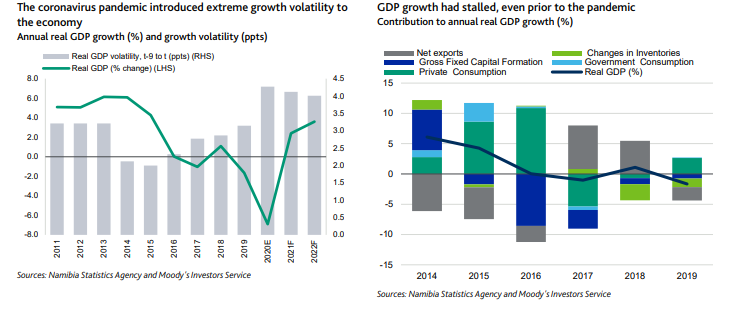Moody's - Namibia's credit profile weakened by pandemic, high public wage bill and vulnerability to shocks

London, March 15, 2021 --
- Namibia's challenges include subdued growth in its largest trading partner South Africa, commodity price volatility and tighter external financing conditions
- Shallow recovery expected this year after severe economic contraction in 2020
The coronavirus pandemic, a very high government wage bill, commodity price volatility, subdued growth in major trading partners, and prolonged tightening in external financing conditions, have weakened Namibia's (Ba3 negative) credit profile, Moody's Investors Service said in an annual report published today.
Moody's expects the country's debt burden to rise to 74% of GDP this year from 72% in 2020 and 56% in 2019. The fiscal deficit is expected to fall to 8.3% of GDP this year following a sharp widening in the 2020 fiscal year to 9.6% of GDP.
"We expect that the government will resume the path of fiscal consolidation to return to a deficit of about 3% in the medium- to long-term and slow the upward debt trajectory," said Kelvin Dalrymple, a Moody's Vice President - Senior Credit Officer and the report's co-author. "Tax measures, both in terms of tax administration and tax rate changes, are expected to offset a fall in South African Customs Union revenue."
The negative outlook reflects risks being slanted to the downside. Implementation of the government's fiscal consolidation plans will prove difficult in a low growth environment, particularly as the government tries to cut the large, but politically challenging, public sector wage bill.
In addition, very large gross borrowing requirements, given the sovereign's continued reliance on short-term funding, point to significant liquidity risk.
Moody's would likely change the outlook to stable if there were indications of growth strengthening in the medium-term. Stronger growth would in turn help rebuild fiscal buffers and bolster foreign exchange reserves, which would enhance Namibia's shock-absorption capacity.
The rating could be downgraded if there were signs of a rise in liquidity risks as the country's capacity to source financing for its very large funding needs at moderate costs erodes. Moreover, the increasing likelihood of the debt burden rising markedly faster and higher than Moody's projects would also be negative.

